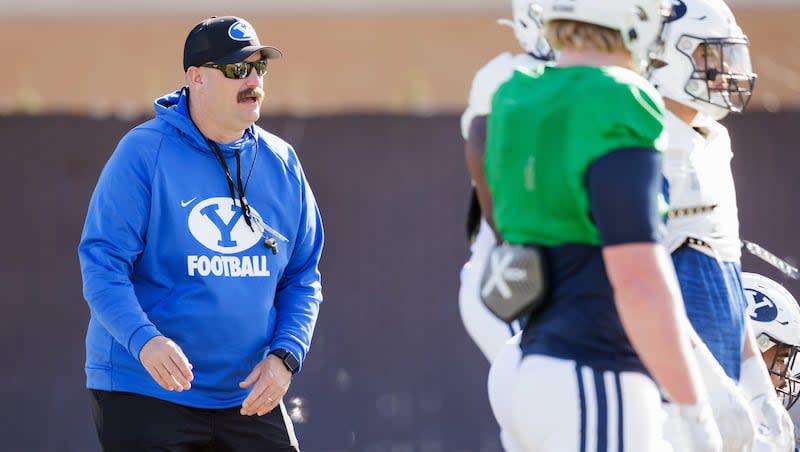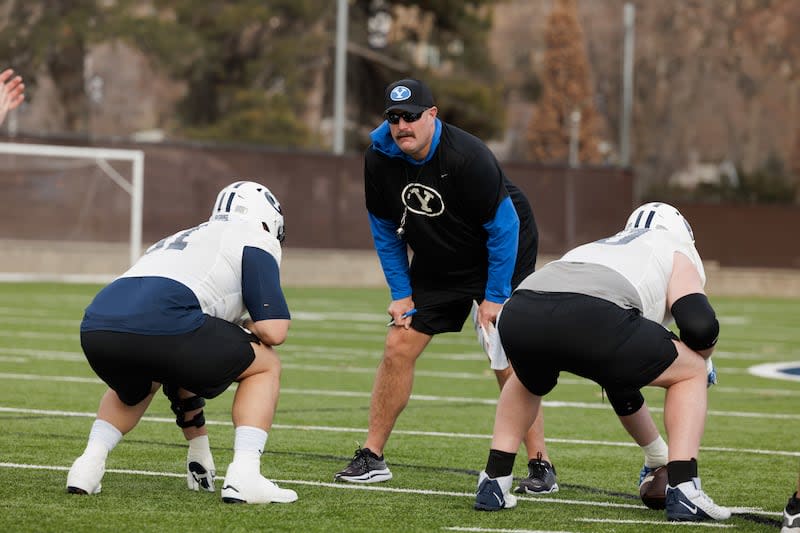Trust is front and center for BYU’s new O-line coach

TJ Woods can be a hero in Provo if he produces an effective Big 12 offensive line at BYU this fall.
It’s a tall order, remembering how BYU’s run game struggled in its inaugural year as a Power Five program with five wins and no bowl game.
“It’s awesome. It’s been a real pleasure to work with a tremendous head coach and work with good people, good coaches, and more importantly, coach great kids. That’s the biggest thing for me.”
BYU offensive line coach TJ Woods
What BYU’s offense needs is a bulldozer-minded front that wants to be physical. It needs hungry players who want to be challenged and led. It needs depth. It needs technicians who can impose their will on opponents and players who hold themselves accountable. It would help if the line could pass block as well, at least better than a year ago.
Of course, every football program wants a taste of that in an O-line.
Woods is up to the task, although he discounts his own importance in turning things around. He’s just thrilled and excited to coach, teach, enjoy the athletes in the room and take it down the road together.
“It’s awesome” Woods says of his first months at BYU. “It’s been a real pleasure to work with a tremendous head coach and work with good people, good coaches, and more importantly, coach great kids. That’s the biggest thing for me.”
One thing that stands out in BYU’s spring practices is who is wearing BYU gear, including Woods, a former instate USU coach.
What head coach Kalani Sitake has done is tap into many of the connections he’s made over his career — regardless of rivalries — to get the best teacher/coach/recruiters available.
If you look at practice, and with Woods, it really stands out.
You have former USU head coach and Utah assistant coach Gary Andersen (advisor), former Utah and NFL defensive lineman Sione Po’uha (defensive line coach), former Utah player and Weber State head coach Jay Hill (defensive coordinator), former Utah and USC defensive coach Chad Kauha’aha’a (advisor) and former Ute receiver Raelon Singleton (advisor).
That’s a lot of former Ute and Aggie coaches wearing BYU colors.
This prompted Hill to tell reporters Monday that in his opinion, “If you are a defensive lineman, there’s not a better place in the country to be than BYU.”
Knowing Woods’ background as an offensive coordinator at UNLV, I sheepishly asked him the value of his input on BYU’s offensive staff.
He wanted no part of singling himself out. His career’s emphasis has been an offensive line coach and run game coordinator. He’ll gladly stay in his lane.
Woods sees himself part of a larger coaching engine on the offensive side. With coordinator Aaron Roderick, pass-game-receiver coach Fesi Sitake, running back coach Harvey Unga and new tight end coach Kevin Gilbride, he is impressed with the talent and experience. Sitake is a former coordinator, as was he. Gilbride has worked in the NFL with the Panthers, Bears and Giants tutoring tight ends.
He likes what he’s seen in returning leaders Connor Pay, Brayden Keim, Weylin Lapuaho and even Oklahoma State transfer Caleb Etienne, now in his second season as a transfer product.
That he’s been an offensive coordinator before isn’t as important for Woods as his responsibility to help the O-line and delivering what he was hired to do. The others, he says, know what they’re doing and he’ll chime in if asked or prompted.
“I’ve always prided myself on being a high-output guy and a low-ego guy. It’s a team sport. You’ve got to play your role and do the best you can and we ask the kids to do the same.”
Woods, who came to Provo from Georgia Southern after stints at Wisconsin, Oregon State, Utah State, UNLV and other stops, was part of Melvin Gordon’s Heisman race in Madison and understands Big Ten line play, the challenges and requirements.
He says being a run-game coordinator is a matter of being organized and knowing what loads are being put on that aspect of the game. The actual call sheets are created along with the other offensive coaches during game week and then it is up to him to keep track, get work done and see that it’s all clear as to what can be productive.
Woods says his first agenda item when he got on campus this winter was to gain the trust of his players, then build his own trust in them. So, it’s been one big welcome, this-is-me-this-is-you experience.
" I think the first step is always the development of trust. Right? I think that’s the biggest piece,” said Woods.
“They have to trust me. First of all they have to trust the technique and my coaching.
“They have to trust that I have their best interests at heart. Then they need to trust each other. The offensive line is the most important unit on the team. It’s exactly why you have to play as a team and that takes trust. It’s no different than any other team that we’re talking about. Whether that’s a family or business or anything else, you have to trust the people you’re working with and I think we’re still in that mode right now.”
Woods said not everything he is doing is new — there is a lot that is the same. “Hopefully we hit the ground running in fall camp.”
Personally, Woods is a native of California but says he and his wife, Kelly, are thrilled to be back in Utah, a place they’ve grown to love over the years. They live in Lehi.


